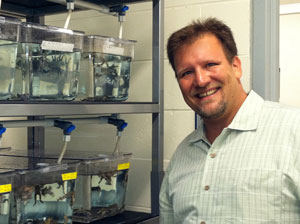 |

For further information, contact the MBL Communications Office at (508) 289-7423 or e-mail us at comm@mbl.edu
FOR IMMEDIATE RELEASE: June 29, 2011
Contact: Diana Kenney, 508-289-7139; dkenney@mbl.edu
Marko Horb Named Director of National Xenopus Resource at the Marine Biological Laboratory
 |
 |
Marko Horb, director of the National Xenopus Resource at the MBL, with Xenopus tropicalis stocks. Photo by Diana Kenney. Click for full size.
Links:
|
|
|
|
WOODS HOLE, MA—Dr. Marko E. Horb has been named director of the National Xenopus Resource (NXR), a center dedicated to supporting scientists nationwide who use the aquatic frog Xenopus for research into the biological basis of human health, disease, aging, and recovery from injury and disability.
Located at the Marine Biological Laboratory (MBL), the National Xenopus Resource was established in 2010 through funding from The Eunice Kennedy Shriver National Institute of Child Health and Human Development and the National Center for Research Resources.
The purpose of the NXR is to breed frogs, provide and house various genetic stocks, and develop new experimental tools and husbandry techniques for Xenopus laevis, a species that is widely used for research in developmental and cell biology (and was used for clinical pregnancy tests for women in the 1930s) and Xenopus tropicalis, a species that is increasingly important for genetic and genomic-based research into human disease and disability.
Because Xenopus can regenerate several body parts at certain life stages, including its limbs, X. laevis and X. tropicalis are also important in the emergent research field of regenerative medicine. The NXR is a key component of the MBL’s Eugene Bell Center for Regenerative Biology and Tissue Engineering, also established in 2010. Horb has a dual appointment at MBL as director of the NXR and associate scientist in the Bell Center.
“The NXR is designed to be an intellectual center, where Xenopus researchers can come spend days, weeks or months, interact with one another, and take advantage not only of the NXR but also of excellent facilities at the MBL for microscopy and for high-speed genetic sequencing,” Horb says. “It’s magnificent how well the NXR fits with the mission of the Bell Center, and we want the Xenopus community to feel part of the Bell Center as well.”
Besides maintaining genetic stocks of the frogs, the NXR will also offer workshops, mini-courses, and meeting facilities to the Xenopus research community, whose particular needs will help shape what the resource will offer. The NXR will also provide complementary research support to the European Xenopus resource based in Portsmouth, England.
Horb, who came to the MBL from the Clinical Research Institute of Montreal, an affiliate of the University of Montreal, remembers well setting up his first independent lab to work with Xenopus. “Husbandry techniques have always been an issue,” he says. “What’s the ideal room temperature for the frogs? How much space do you need? What are the options for a recirculation system? When I started my lab, I had to develop my own system for maintaining Xenopus and nobody taught me how. It would have been great if I could have gone to a short course to learn the best methods. That is one type of course the NXR can offer, so people can incorporate the animals into their labs with less cost and hassle.”
Originally from Chicago, Horb completed his Ph.D. in cell and developmental biology at Stony Brook University and conducted postdoctoral research at the University of Bath, England. His research is focused on the detailed steps and signals that lead to development of the pancreas and other organs of the endoderm, including the liver. In 2003, Dr. Horb successfully converted liver cells into all types of pancreas cells in Xenopus. His lab continues this research with the goal of specifying the liver cells to become solely insulin-producing pancreatic cells, which could potentially provide a therapy for diabetes.
The Marine Biological Laboratory (MBL) is dedicated to scientific discovery and improving the human condition through research and education in biology, biomedicine, and environmental science. Founded in 1888 in Woods Hole, Massachusetts, the MBL is an independent, nonprofit corporation.
|